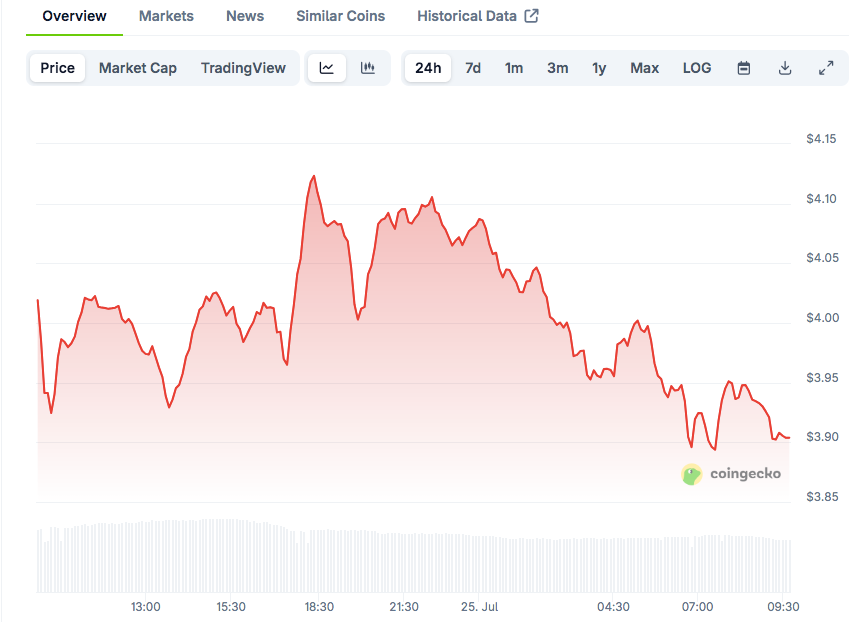TLDR:
- Polkadot’s DOT lacks price momentum due to weak spot demand and minimal required token use.
- New features like Plaza and Coretime aim to tie network activity directly to DOT.
- Projects can now scale with DOT-based compute, replacing one-off parachain auctions.
- Despite tech upgrades, market sentiment hasn’t caught up with Polkadot’s progress.
Polkadot’s native token, DOT, remains under pressure even as the network rolls out high-impact updates. Despite strong fundamentals and new real-world use cases, demand for the token hasn’t caught up.
DOT’s price action remains sluggish, confusing many in the crypto space. While developers continue to build, the market hasn’t reflected that momentum. A closer look reveals the gap between adoption and token value.
The Real Reason Behind DOT’s Weak Price
According to crypto analyst Orlando (@OrlandoG85), DOT’s low spot demand is the main problem, not governance, complexity, or inflation.
He explained that early design choices failed to tie core network activity back to DOT utility. Projects using Polkadot’s infrastructure weren’t required to buy or hold the token long-term. That worked during the hype of parachain auctions, but it hasn’t aged well.
Polkadot
~ Price and Demand (Lets talk)
The main question everyone asks about Polkadot is…
Why is DOT’s price struggling even though it has some of the best tech in the space?Today I want to talk about price and token demand
Many will point fingers at a few usual… pic.twitter.com/pvuhIZpDDp
— Orlando
(@OrlandoG85) July 25, 2025
Polkadot launched as a Layer 0 network, built for custom blockchain development using tools like Substrate and the Polkadot SDK. Projects could launch their own chains, with their own tokens, while using Polkadot’s shared security. In theory, this was a win. In practice, it disconnected core adoption from DOT price action.
In the original model, projects competed for parachain slots by locking up DOT.
This created temporary demand, especially during crowdloans. But after the two-year lease, that demand vanished. Once onboarded, chains operated with minimal DOT involvement. That left staking, governance, and speculation as the only remaining use cases.
This shift dried up organic demand. And during bearish cycles, those limited drivers couldn’t sustain price. Despite strong tech, DOT slipped out of favor. At publication, DOT trades at just below $4, a level it has stagnated at for a while now.

Polkadot’s New Pillars: Gas, Scaling, and Coretime
The network has now shifted toward a more sustainable system for DOT. Orlando pointed to three major changes.
First, Plaza, Polkadot’s smart contract hub, goes live in September. For the first time, developers will pay gas fees in DOT directly on the main chain.
Second, the move to Auto-Renewing Coretime means projects must now pay for compute power every 28 days. That creates recurring, predictable demand for DOT.
Third, Elastic Scaling will allow chains to rent more cores on demand, scaling horizontally. The more a project grows, the more DOT it needs for compute.
With these three features, DOT is finally tied to actual network activity. But market recognition remains slow. Orlando says many still don’t see the value-price disconnect. Projects are quietly migrating to Polkadot for its flexibility and scale. They’re building blockchains, not just apps.
As the new model matures, recurring usage could replace short-term hype. For now, DOT sits at a price that may not reflect its utility.
The post Why Polkadot’s DOT Token Price Still Struggles, Despite Major Tech Upgrades appeared first on Blockonomi.
This articles is written by : Nermeen Nabil Khear Abdelmalak
All rights reserved to : USAGOLDMIES . www.usagoldmines.com
You can Enjoy surfing our website categories and read more content in many fields you may like .
Why USAGoldMines ?
USAGoldMines is a comprehensive website offering the latest in financial, crypto, and technical news. With specialized sections for each category, it provides readers with up-to-date market insights, investment trends, and technological advancements, making it a valuable resource for investors and enthusiasts in the fast-paced financial world.


